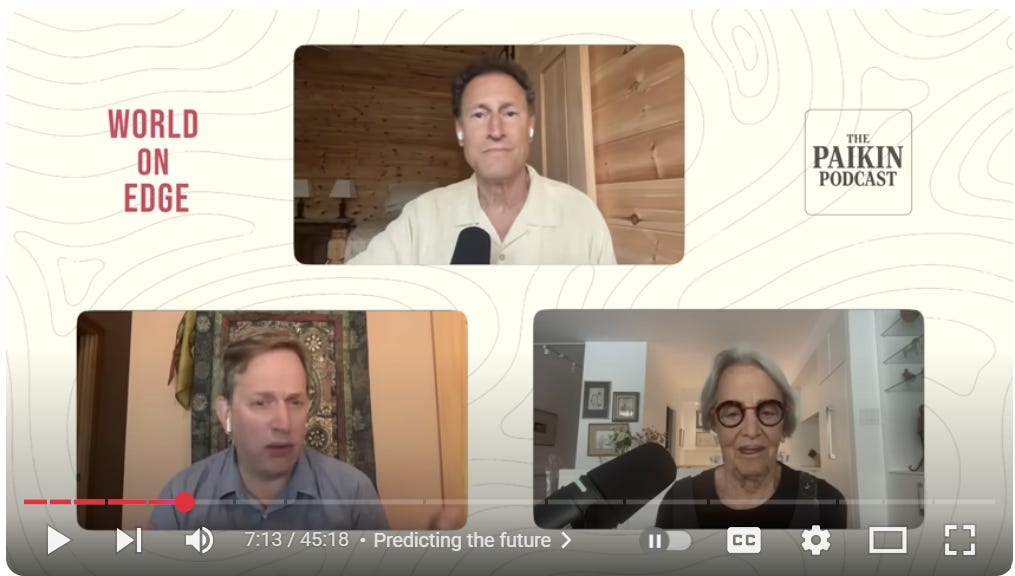Is the U.S. invasion of Canada so unimaginable?
Steve Paikin asks us to consider the question seriously
Good morning – I’m sharing an interesting interview by journalist Steve Paikin for your enjoyment this long weekend. My thanks to everyone who works hard to make Canada a better place this Labour Day.
In peace,
Steve
It’s difficult for us to imagine a future that’s different than today, because so much of our understanding of today is based upon our past.
For instance, can we imagine a future where the United States is not our ally? And if it’s not our ally, might it be our enemy?
In the days leading up to the Russian invasion in February 2022, many, if not most Ukrainians did not believe that they were about to be invaded by their much larger and more powerful neighbour. It was almost unthinkable.
But here we are: Russia occupying vast swaths of Ukraine and firing missiles into apartment buildings almost every night.
Is there a lesson for Canada?
These are the questions considered by guests of this interesting podcast by well-known journalist Steve Paikin (formerly of CBC and TVO) on his new program, The Paikin Podcast. As an aside, I appeared on Steve Paikin’s TVO program The Agenda on several occasions over the years.
In this episode titled, “Will Canada Survive,” Canadian author and podcaster Stephen Marche joins with Janice Stein to discuss the threat America poses to Canadian sovereignty, if we are prepared for Trump’s new world order, how we can learn from Ukraine and Finland, and how we can defend ourselves both economically and militarily.
Janice Stein argues that the U.S. is no longer a dependable ally because its behavior has become unpredictable, making it more of a neighbor than a steadfast partner.
But Stephen Marche takes a more dire view, suggesting that Canada must seriously rethink its national security and foreign policy in response to a potentially declining, unstable America. He emphasizes that Canada has never considered the possibility of needing to defend itself against American aggression, whether military or economic.
This episode offers a sobering examination of Canada’s precarious position as its historically reliable neighbor, the United States, faces profound internal crises and shifts toward authoritarianism.
The discussion between Marche, Stein and Paikin balances caution with practical analysis, urging Canadians to prepare for unpredictable futures without succumbing to paranoia or defeatism.
It highlights the need for Canada to rethink its defence, economic policies, and international alliances comprehensively, learning from other nations’ experiences, and recognizing the limits of past assumptions.
Here are some of the highlights (machine generated)
Janice Stein declares the U.S. is no longer a reliable ally to Canada, emphasizing unpredictability in American behavior.
Ukraine’s experience shows how neighbors can be unexpectedly invaded, a cautionary parallel for Canada’s relationship with the U.S.
Stephen Marche highlights America as a complex, cascading system with unpredictable outcomes, making traditional diplomatic approaches insufficient.
Trump is seen as a symptom of American institutional decline rather than its cause, signaling deeper systemic issues.
Marche advocates for a Finnish-style national defense system in Canada to deter potential aggression and ensure sovereignty.
Marche’s new 8-part series called “Gloves Off” aims to awaken Canadians to a national emergency requiring a radical rethink of defence, economy, and alliances (I look forward to listening to it – you might too). Here is Marche’s first episode of Gloves Off titles “How much trouble are we in?” available on YouTube.
Leave a comment explaining your vote.
Most would be surprised if Trump wins the Nobel Peace Prize (but not all)
Last week’s article looked at American President Trump’s ambitions to win the Nobel Peace Prize. I asked you, “Would you be surprised if Trump is given the Nobel Peace Prize?” Three out of four answered, “Yes” (72%) while one out of four answered, “No” (24%).
Here are some readers’ comments:
“Giving him the Nobel Peace prize would destroy the significance and value of the award.” – Frances Brady
“Awarding a Nobel Prize to a person who is making the world more unsafe and a threat to human survival is just plain madness.” - Gord Doctorow
“I wouldn't be surprised because it would obviously be a political move on the part of the Committee.” – Eleanor Millard
Did you miss last week’s newsletter?
Viewed 1.9k times
Thank you for everything you do for peace. If you support PeaceQuest’s peace education impact, please consider becoming a paid subscriber for $5.50 per month, or $55 annually (an 18% savings).
Steve





For the remaining of this Presidents term, it’s about 50% likely. Dependent on our ability to prepare a deterrence. This chance will steadily decline in time.